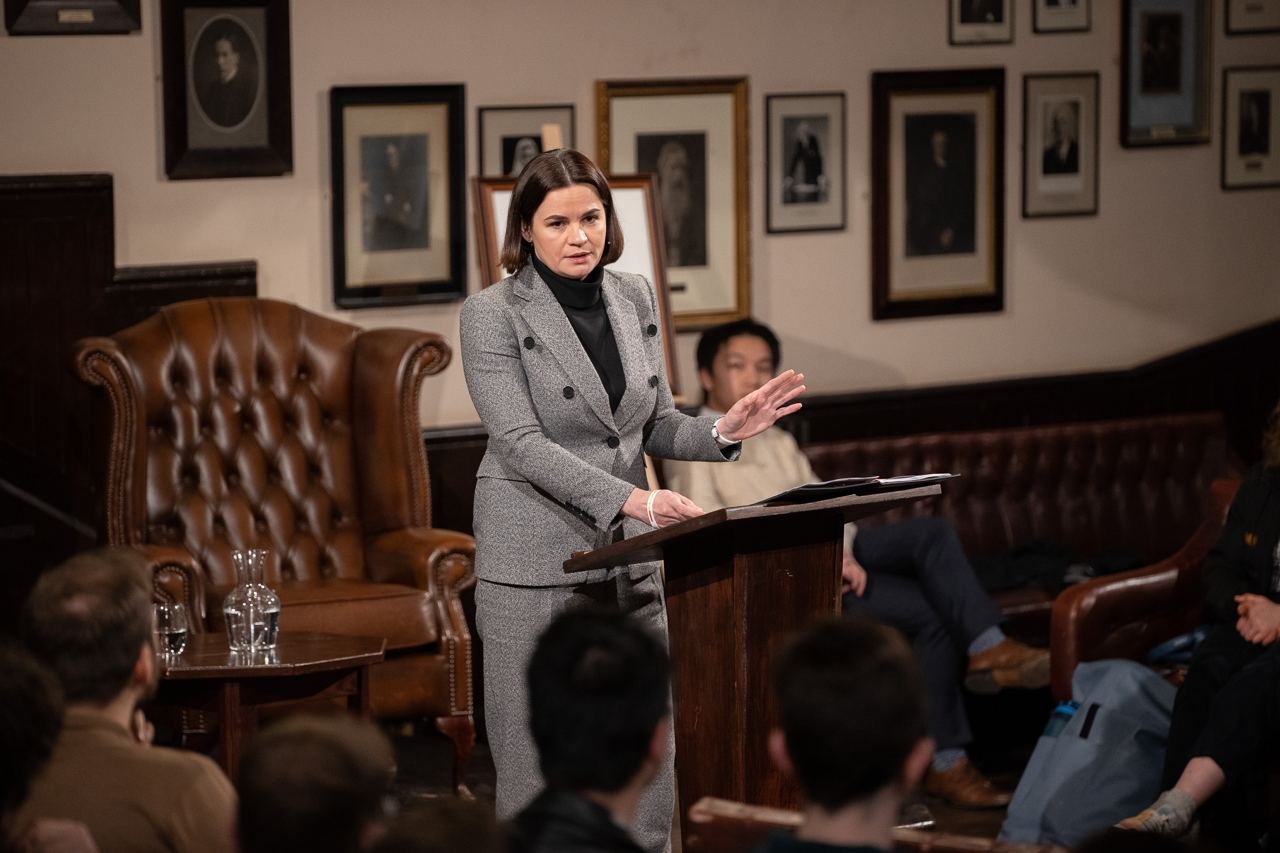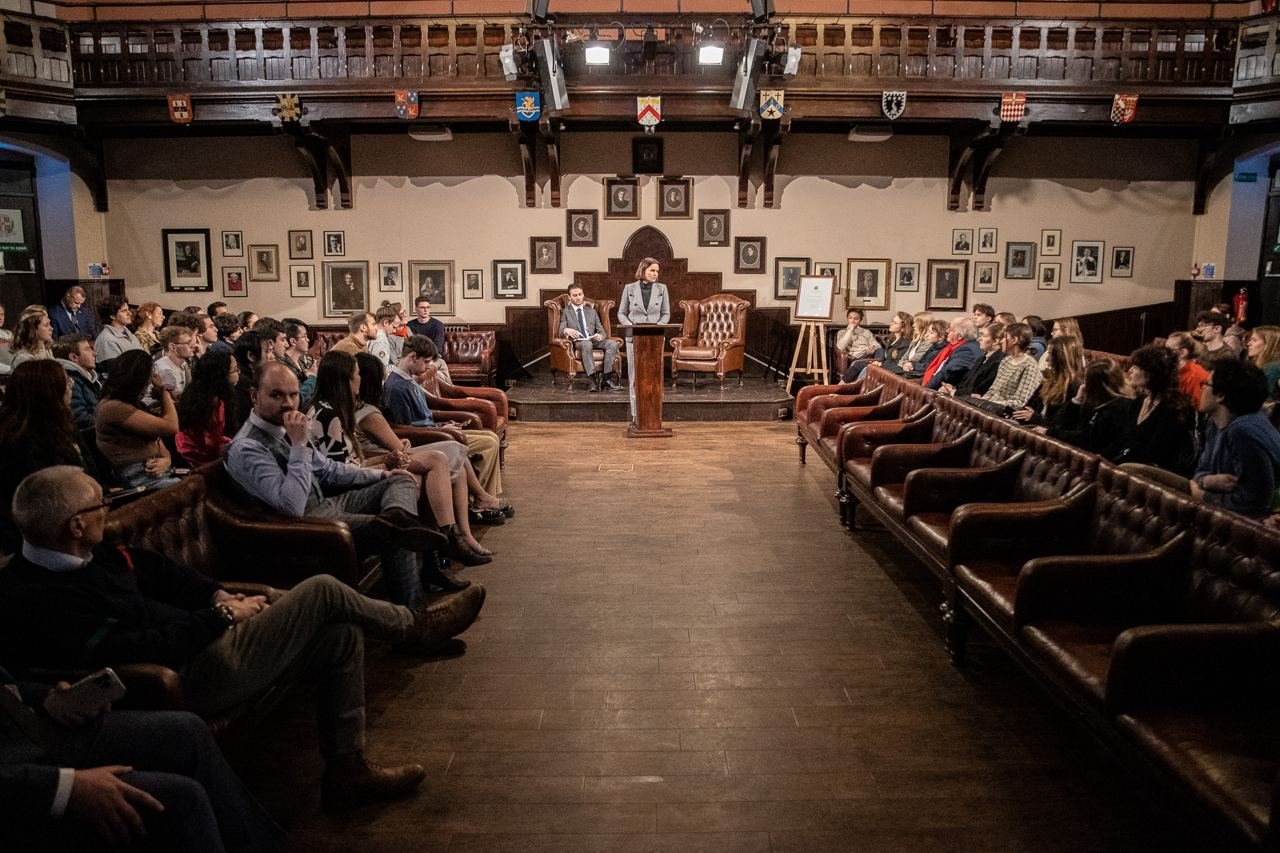“Dear friends,
It is a big honour to be here at the Cambridge Union today. I am aware that your past speakers include British prime ministers Winston Churchil and Margaret Thatcher, US presidents Theodore Roosevelt and Ronald Reagan, and the spiritual leader of Tibet, The Dalai Lama.
All are titans of the political landscape whose names echo through the ages…
Which makes me feel even more nervous! As you know I am still very new in politics, and speaking in front of a big crowd is a real nightmare for me. I am still – how do you say? – learning the ropes!
As you may know, I am only here because of what happened to my husband. Almost three years ago, Siarhei was standing for election when the tyrant Lukashenko ordered the secret police to lock him up, along with every other potential political opponent.
But they forgot about me! (That often seems to happen with women.) Unfortunately for Lukashenko, after I stepped up to replace Siarhei, the people of Belarus voted overwhelmingly for me to be president. This terrified Lukashenko, who then stole the election. It kickstarted a revolution in Belarus that continues to this day.
The regime unleashed the massive terror against Belarusians. 60,000 passed through the prisons. Many got beaten, tortured, some were killed. Feeling impunity, Lukashenka became the threat to entire region: he hijacked the Ryanair flight, orchestrated the migration crisis, and then became Putin’s complicit in the war against Ukraine.
The West imposed sanctions on the regime. Russia deployed its troops on Belarus territory. And Belarus appeared to be under threat of loosing independence. The repressions intensified, and Belarus began to resemble North Korea more and more…
But of course, many of you know the situation in Eastern Europe very well. You are experts and professionals in the field. So I did not come here to teach you. I’m sure you get enough of that here, at Cambridge university, already. No, I actually came here to listen and learn from you.
Normally, you ask your guests questions about their work and opinions. However, it often happens in life that those who are supposed to know the answers sometimes just don't have them.
In politics, it is not only the case with rhetorical questions, like “How is it possible that one country invades another and claims it was attacked itself?” or “How can crimes against humanity be justified by any ideology?”
Sometimes there are also very practical questions, and these I would like to pose to you today.
These questions are dilemmas that I face every day. I hope that my questions will help you to understand the political situation in Belarus and the role of democratic political institutions in it. So let's start.
- The first question is: should the West lift sanctions against Lukashenka's regime in exchange for political prisoners?
The West imposed sanctions in response on human rights violations and war crimes of the regime. The sanctions deprive the regime of resources, destroy corruption schemes, and split the elites. Imposing sanctions, the west sends the strong signal to the regime: there will no be impunity, and such behavior will not be tolerated
More than that: sanctions deprive the regime of money that fuel the repressions and the war machine. We already see how Russia is using Belarus to bypass sanctions, and there are multiple loopholes that allow the regime to continue trade as it was before
However, some may argue that ordinary people suffer from sanctions, not the regime’s cronies. It’s true that the economic situation in Belarus is worsening, but is it worsening because of sanctions, or bad management? – hard to say.
Others will say that sanctions push the regime into the hands of Russia. The regime is cornered and it has to ask Putin for help. If not for sanctions, they say, the regime would be more open for dialogue.
There is another proposal I often hear: Let’s exchange political prisoners for lifting sanctions. It sounds good in theory. This could save thousands of people. The problem with this approach: what will stop the regime from taking new hostages and continue to blackmail the west? It reminds negotiating with terrorist. If you pay a terrorist once, you end up paying him forever.
There is also moral aspects of such exchange: If we agree for such exchange, wouldn’t we betray goals for what these people were fighting for? Doesn’t it mean that they suffered for nothing
- The second dilemma can be put in these words: human lives or human rights?
In 2020 Belarus was on the top of world’s agenda. Hundreds of thousands of Belarusians showed unity and bravery. Hundreds of thousands were marching on Belarus streets. The protest was toppled by the regime’s violence. Belarusians faced a humanitarian catastrophe.
When the war in Ukraine started, the Belarus humanitarian crisis was overshadowed. I heard from western politicians, that it’s not the right time for Belarus while people in Ukraine are dying.
On one hand, the scale of the catastrophe in Ukraine is incomparable to what Belarusians are going through. On the other hand, these two crises are interconnected. Lukashenka is using the war as a cover to suppress all dissent.
But if we close our eyes on Lukashenka’s crimes against Belarusians today, doesn’t it mean we agree to compromise our values.
- Third dilemma that is connected to previous one: should we treat Lukashenka the same as Putin?
Lukashenka is already taking part in the war on Russia’s side since the very first day. He hoped that it would be a blitzkrieg, and that he would be marching in Kyiv’s streets alongside Putin.
It did not happen. Ukrainians demonstrated unbelievable bravery and resilience. The Russian plan for a quick war failed. Lukashenka continued to support Putin: with military infrastructure, weapons, and allowed them to use our territory. Belarus became a launching pad for Russian missiles. The only thing that did not happen: Belarusian troops did not enter Ukraine.
Some believe that Lukashenka is not a complicit in this war, but a victim. That Putin puts pressure on him, and he resists.
I also heard from western politicians that we should not sanction Lukashenka, because it might force him to enter the war in Ukraine. And we see already, that for more than one year the EU is hesitant to sanction Lukashenka, exactly because of this reason.
- Fourth dilemma. How should Ukrainians perceive Belarusians? As aggressors or brothers in arms?
Belarusians did not elect Lukashenka. He usurped power in 1994, and no free elections have taken place since then. However, many Ukrainians did not follow the political situation in Belarus, and did not distinguish Lukashenka and his regime from the Belarusian people.
When the war started, Ukrainians immediately blamed Belarusians as enemies, as barbarians and murderers.
But some would say: it is your country, and you are responsible for what your leadership is doing. The missiles are being launched from your territory, and you are also guilty of that.
So who is responsible? Lukashenka who allowed Russian troops on Belarus territory, or Belarusians who did not stop Lukashenka from doing that?
Belarusians continue to demonstrate that they support Ukraine so much as they can. When war has started, our people carried out more than 80 acts of sabotage on the railroads, blocking Russian troops from attacking Kyiv. More than 30 000 people take part in the Belaruski Hayun monitoring project. There is a chat bot in the Telegram app, where people keep posting photos of Russian army convoys to track their movements. The most recent act of sabotage damaged a Russian war plane A50 valued at half-a-billion dollars valued that was coordinating Russian missile attacks on Ukraine.
Of course there are those who support Russia’s war and Lukashenka’s regime. They are a minority, with a monopoly on power. So should we all take responsibility for their actions?
- Fifth dilemma. Is violence the only means of political change?
In 2020, we chose a non-violent way of resistance, and we stick with that. We organized workers strike, pickets, we called for national dialogue and reconciliation. We believed that only non-violent and peaceful changes can bring sustainable peace and democracy.
Ordinary citizens with bare arms were not able to counter armed state thugs in balaclavas who were shooting at everyone, including women and children.
I am sometimes told that it was my mistake to call for non-violent protest. That if I will call people to take arms, then the situation might have developed differently, and Lukashenka wouldn’t be in power now.
But would Belarus have same support and solidarity from the West if Belarusians had taken up arms back then? Wouldn’t it unleash even more violence and lead to more victims? Would it not have led to Russian troops entering Belarus, and the chance for peaceful changes would have been crushed and lost forever? I don’t know.
I’ve mentioned dictators, but what about Lukashenka’s servants and officials? The Belarusian state apparatus is huge. There are many criminals among state representatives, who are going to be legally prosecuted as soon as the rule of law and democracy is established in Belarus. There can be no doubt about that.
- So my sixth dilemma is about people who stand with Lukashenka now.
Should the government officials be excluded from the process of democratic transformation in Belarus? Should there be an amnesty? And even if theoretically there should, what message does it send to them now, when we are talking about future amnesties?
Aren’t they even more willing to unite around Lukashenka, fearing a kind of retaliation from the people? If we guarantee them a kind of immunity, wouldn’t they be more willing to cooperate with the new democratic government, or even to undermine Lukashenka’s power today by not carrying out his illegal orders?
- And my last dilemma is about diplomacy. Should the European countries keep their ambassadors in Minsk?
In eyes of Belarusians, ambassadors handing their credentials to Lukashenka would mean recognising him as a legitimate president, which he is definitely not.
But, at the same time, by staying in the country, the Ambasssadors can play some role like issuing visas, visiting political prisoners, collecting information. But from practice we see, that their actions are very limited and the regime is using them to legitimize itself. We see that many of these tasks might be performed by Charge d’Affaires.
But some would say, that if no foreign ambassadors are in the country, we just undermine the country's independence. So if all ambassadors left, it would just mean that Belarus completely lost its sovereignty.
So what’s more important here: to delegitimize the regime, or to keep some presence for some limited but still important activities.
I just listed a couple of questions. But every day we face dozens of such dilemmas. We are living through difficult times which put us before very difficult choices. I would be grateful for your opinion, for your thoughts and your advice.
I believe that the most important thing in answering these questions is to stay true to oneself. To one’s values and principles. I’m sure that a principled moral position is what pays off in the long-term run. Surprisingly, even in politics.
Thank you.”









